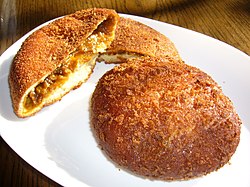You can help expand this article with text translated from the corresponding article in Japanese. (June 2023) Click [show] for important translation instructions.
|
Curry bread (カレーパン, karē pan) is a popular Japanese food. It consists of Japanese curry or other types of curry wrapped in a piece of dough, which is then coated in bread crumbs and deep fried.[1] On occasion it is baked instead of deep-fried, but deep-frying is the most common method of cooking. Curry bread is usually found in bakeries and convenience stores.
 Curry bread | |
| Alternative names | karē pan |
|---|---|
| Type | Bread |
| Place of origin | Japan |
| Created by | Nakata Toyoharu (?) |
| Invented | 1927 (?) |
| Main ingredients | Dough, Japanese curry, bread crumbs |

History
editThe exact origin of curry bread in Japan is unknown, but it is often said that it was created in 1927 by a man named Nakata Toyoharu.[2][3] It was during this time period that foods from Western countries were becoming popular in Japan and many businesses were experimenting with making Japanese-style Western dishes.[2] As curry was introduced to Japan by Anglo-Indian Royal Navy officers, curry bread was originally called "Western food bread" (洋食パン, yōshoku pan) when it was first sold in Tokyo during the early Shōwa era.[4][5] It eventually became widely referred to as "curry bread" (カレーパン, karē pan) due to its curry filling.[5]
In popular culture
editSee also
edit- Bunny chow – South African dish consisting of a hollowed-out loaf of white bread filled with curry
- Curry puff – Pastry with curry filling
References
edit- ^ Sen, Colleen Taylor (2009). Curry: a Global History. London: Reaktion Books. p. 116. ISBN 9781861895226.
- ^ a b "カレーパンの起源 – 日本カレーパン協会". currypan.jp. Retrieved 2024-07-09.
- ^ "歴史 | 全日本カレーパン振興会、ニュースサイトのカレーパン通信。カレー総研/カレー大學が運営" (in Japanese). Retrieved 2024-07-09.
- ^ Itoh, Makiko (2011-08-26). "Curry — it's more 'Japanese' than you think". The Japan Times. Retrieved 2024-07-16.
- ^ a b "カレーパンの歴史 | カレーパンの平川" (in Japanese). Retrieved 2024-07-09.
- ^ Sen 2009, p. 116
External links
edit- Media related to Curry breads at Wikimedia Commons
- How to make curry bread